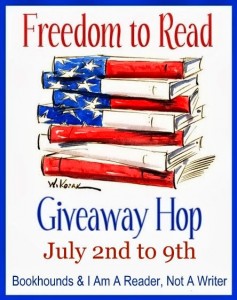 Welcome to my blog! The week of 2 July – 9 July, I’m participating with more than one hundred other bloggers in the “Freedom to Read” giveaway hop, accessed by clicking on the logo at the left. All blogs listed in this hop offer book-related giveaways, and we’re all linked, so you can easily hop from one giveaway to another. But here on my blog, I’m posting a week of Relevant History essays, each one focused on some facet of the American War of Independence. To find out how to qualify for the giveaways on my blog, read through each day’s Relevant History post below and follow the directions. Then click on the Freedom Hop logo so you can move along to another blog. Enjoy!
Welcome to my blog! The week of 2 July – 9 July, I’m participating with more than one hundred other bloggers in the “Freedom to Read” giveaway hop, accessed by clicking on the logo at the left. All blogs listed in this hop offer book-related giveaways, and we’re all linked, so you can easily hop from one giveaway to another. But here on my blog, I’m posting a week of Relevant History essays, each one focused on some facet of the American War of Independence. To find out how to qualify for the giveaways on my blog, read through each day’s Relevant History post below and follow the directions. Then click on the Freedom Hop logo so you can move along to another blog. Enjoy!
*****
For two centuries, a number of myths have circulated about certain aspects of the American War of Independence. Other historians and I have debunked some of those myths in our writings. One worth examining for 21st-century Americans is the myth that the civilian population during the Revolution was made of zealous Protestants. You can see an example of that myth in the historically inaccurate movie “The Patriot,” with its imagery of an overly enthusiastic young woman recruiting men from a Protestant congregation into joining a militia against the redcoats.
Firebrand Protestants could definitely be found during the war. Britons sometimes referred to the American War as the “Presbyterian War.” But although a good number of people of the thirteen colonies and surrounding territories were Christians, they weren’t all Presbyterians or even Protestants. And the residents of America certainly weren’t all Christian.
Christianity in America during the Revolution
In Revolutionary America, Christianity was splintered into diverse sects that weren’t on the same page about how their faith should be interpreted and expressed. Probably the largest and most influential sects were Anglicans, Congregationalists, and Presbyterians. In addition, there were groups of Puritans, Dutch Reformed, Quakers, Lutherans, Baptists, Anabaptists, Mennonites, Amish, Eastern Orthodox, and English Roman Catholics. There were likely also groups of French Huguenots and Spanish, Portuguese, and Italian Catholics. Thus Christianity in Revolutionary America was by no means a unified religion.
Founding Fathers
Most of America’s founding fathers were Christian, but the religious persuasions of a few elude definition. “Deism” has been the label ascribed to the religious preferences of certain of America’s prominent founding fathers. In his book The Religious Beliefs of America’s Founders: Reason, Revelation, and Revolution, historian Gregg L. Frazer makes the case that John Adams, Thomas Jefferson, Benjamin Franklin, Alexander Hamilton, George Washington, and several others were actually theistic rationalists—neither deists nor Christians.
Jews
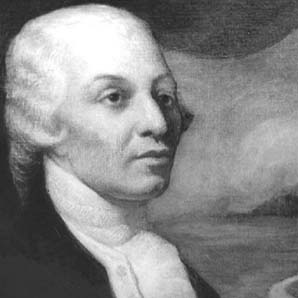 A financial broker who helped fund the Continentals, Haym Solomon, an Ashkenazi Jew from Poland, is the most famous Jew associated with the American War of Independence. From the number of congregations in existence at the time of the war, Solomon must have been one of many Jews in America. The goals of the Congress appealed to most Jews because they’d been persecuted for centuries elsewhere in the world.
A financial broker who helped fund the Continentals, Haym Solomon, an Ashkenazi Jew from Poland, is the most famous Jew associated with the American War of Independence. From the number of congregations in existence at the time of the war, Solomon must have been one of many Jews in America. The goals of the Congress appealed to most Jews because they’d been persecuted for centuries elsewhere in the world.
Muslims
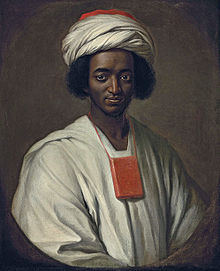 On occasion, Africans captured for the slave trade proved to be literate Muslims who could transcribe the Quran from memory. Here are two examples provided by Daniel Dillard, a doctoral candidate in religion at Florida State University:
On occasion, Africans captured for the slave trade proved to be literate Muslims who could transcribe the Quran from memory. Here are two examples provided by Daniel Dillard, a doctoral candidate in religion at Florida State University:
Job Ben Solomon Jallo (1701–1773), also known as Ayuba Suleiman Diallo, a Senegalese Muslim of aristocratic birth enslaved for a brief period in Maryland, composed three separate copies of the Quran solely from memory. Abdulrahman Ibrahim Ibn Sori (1762–1829), also known as Abd ar-Rahman, the famous West African prince enslaved for 40 years in Mississippi, occasionally delighted audiences by telling them he was writing out ‘‘The Lord’s Prayer’’ in Arabic, when in actuality he had transcribed the first sura, or chapter, of the Quran, known as the fatiha.
George Sale translated the Quran into English, advertised it in American newspapers, and made it available in bookshops. As a result, a number of Americans during the Revolution owned copies of the Quran and were familiar with the Muslim religion.
Thomas Jefferson studied the Quran. It may have influenced his work on the Declaration of Independence.
Other Non-Christians
Native Americans engaged in various spiritual practices—monotheistic, polytheistic, henotheistic, animistic, or a combination of those. Indentured servants from the British Isles or Germany who were transported or took passage to better themselves brought with them folk religions in addition to Christianity. Captured Africans who weren’t Muslim contributed varied polytheistic religions to the mix, and those slaves who embraced Christianity in America didn’t always abandon their native religion.
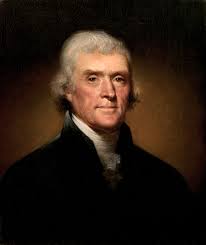 A number of the nation’s founders left written records showing that they were comfortable with and supportive of faiths other than Christianity. Plus they’d seen the problems caused by state religions in other parts of the world. After the Treaty of Paris, for the good of the new country, they steered the development of the United States of America toward a government that would tolerate a variety of religions. Here are Thomas Jefferson’s famous words about religion and government:
A number of the nation’s founders left written records showing that they were comfortable with and supportive of faiths other than Christianity. Plus they’d seen the problems caused by state religions in other parts of the world. After the Treaty of Paris, for the good of the new country, they steered the development of the United States of America toward a government that would tolerate a variety of religions. Here are Thomas Jefferson’s famous words about religion and government:
Believing with you that religion is a matter which lies solely between Man and his God, that he owes account to none other for his faith or his worship, that the legitimate powers of government reach actions only, and not opinions, I contemplate with sovereign reverence that act of the whole American people which declared that their legislature should ‘make no law respecting an establishment of religion, or prohibiting the free exercise thereof’ thus building a wall of separation between Church and State.
In America, religion-based hate crimes undermine the goal of religious diversity that the country’s founders sought. Such crimes destabilize the freedoms we enjoy today—freedoms that thousands of people purchased for us with their lives from 1775–1783 and in subsequent wars.
What do you think about the position of our founders on religious diversity? In what ways would America be different today had their position been less tolerant?
The 2014 “Week-long Fourth of July” wouldn’t have been possible without you or my talented guests: Lars D.H. Hedbor, Helena Finnegan, Dr. Christine Swager, David Neilan, Tim Osner, Sheila Ingle, and Jack Parker. What worlds can they open for you? Browse back through the posts. Look for their works. Then comment here on something you learned this week that made history relevant to you. Thanks for stopping by!
(Thanks to James Stewart, Thad Weaver, William Myers, and Martha Katz-Hyman for input on this essay.)
*****
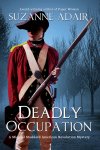 …
… 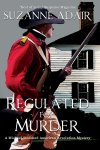 …
… 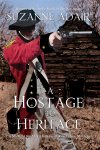
Contribute a legitimate comment on this post by today at 6 p.m. ET to be entered in a drawing to win a copy of one of my books, the winner’s choice of title and format (trade paperback or ebook). Delivery is available worldwide. Make sure you include your email address. I’ll publish the names of all drawing winners on my blog the week of 14 July.
**********
Did you like what you read? Learn about downloads, discounts, and special offers from Relevant History authors and Suzanne Adair. Subscribe to Suzanne’s free newsletter.
